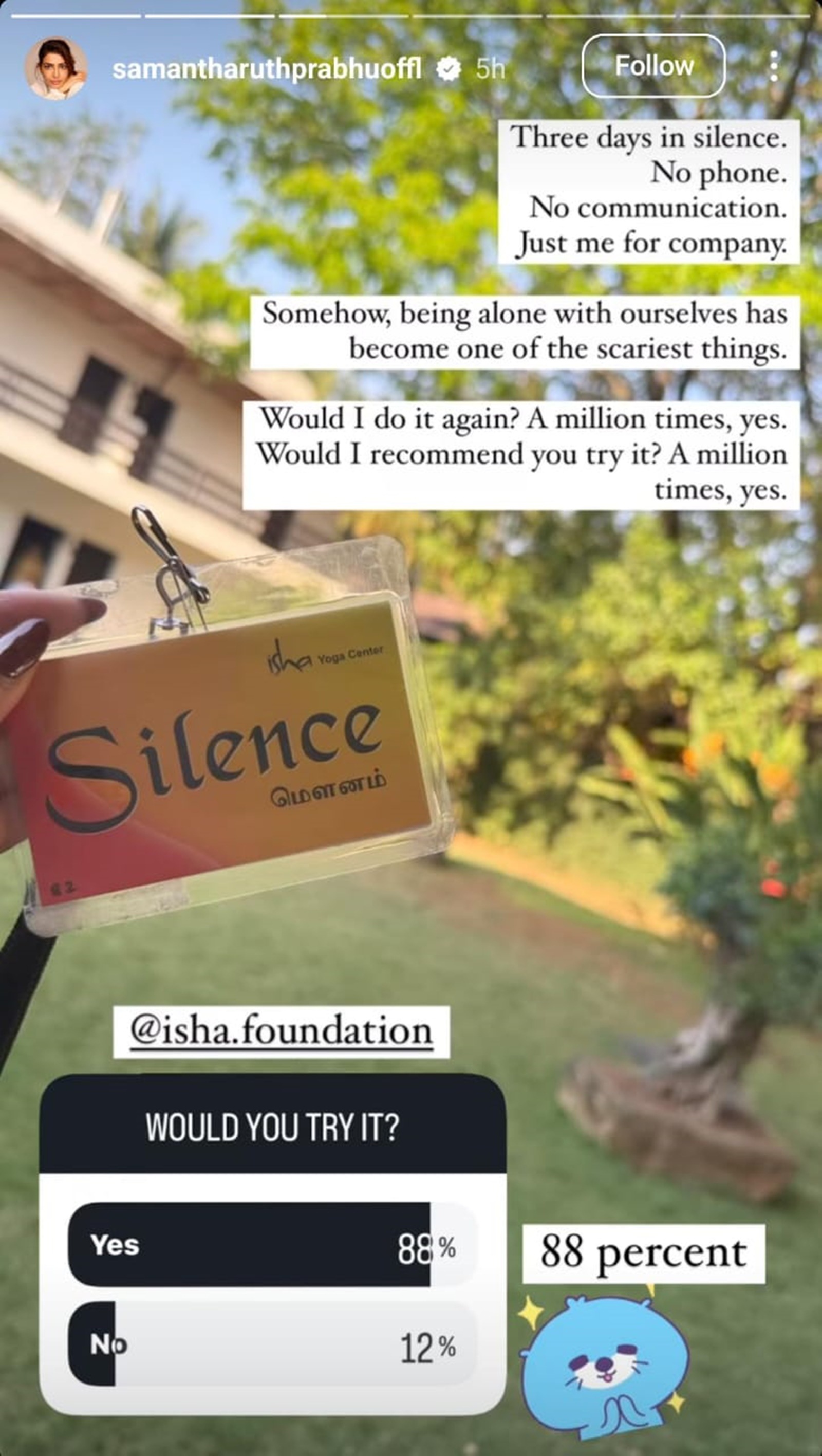📣 For more lifestyle news, click here to join our WhatsApp Channel and also follow us on Instagram
‘One of the scariest things’: Samantha Ruth Prabhu reflects on experiencing solitude at silent retreat
"Would I do it again? A million times, yes. Would I recommend you try it? A million times, yes," she wrote.
 Samantha Ruth Prabhu found the experience deeply transformative (Source: Samantha Ruth Prabhu/Instagram)
Samantha Ruth Prabhu found the experience deeply transformative (Source: Samantha Ruth Prabhu/Instagram)In a post shared on her Instagram stories, actor Samantha Ruth Prabhu reflected on a profound experience — spending three days in complete silence, without any phone or communication.
Sharing her thoughts, the Kushi star described the retreat as both challenging and rewarding. “Three days of silence. No phone. No communication. Just me for company. Somehow, being alone with ourselves has become one of the scariest things. Would I do it again? A million times, yes. Would I recommend you try it? A million times, yes,” she wrote.
Despite the initial difficulty of disconnecting, Samantha found the experience deeply transformative. Earlier, Grammy award-winning American singer SZA also tried the Samyama wellness programme at the same retreat, disconnecting from everything and focusing on inner cleansing through complete silence.
However, many people struggle with complete silence and solitude, especially in today’s hyper-connected digital age. But is that the case, and what does that reveal about modern lifestyles? An expert weighs in.
Neha Cadabam, senior psychologist and executive director at Cadabams Hospitals, tells indianexpress.com, “A silent retreat offers a break from the relentless stimuli of daily life, allowing the mind to settle into a state of calm and clarity. In this quiet environment, individuals can observe their thoughts without interruption, leading to enhanced mental clarity and more deliberate decision-making. Emotionally, many experience reduced stress and heightened inner peace as they gain a clearer understanding of their feelings.”
Struggle with complete silence and solitude
Cadabam notes that many individuals feel uneasy in complete silence and solitude because modern life is dominated by constant stimulation — from smartphones, social media, and a 24/7 news cycle. This continuous barrage of external input conditions our minds to seek distraction and validation, making the sudden absence of noise feel like a void.
“Such discomfort reveals that our current lifestyles often leave little space for introspection and self-reflection. We become so accustomed to external engagement that being alone with our thoughts can trigger anxiety, revealing an underlying dependency on external cues to structure our inner lives,” she adds.
 Samantha Ruth Prabhu described the retreat as both challenging and rewarding (Source: Instagram/Samantha Ruth Prabhu)
Samantha Ruth Prabhu described the retreat as both challenging and rewarding (Source: Instagram/Samantha Ruth Prabhu)
Simple ways to incorporate moments of intentional silence into daily life
For those unable to commit to a multi-day retreat, even short periods of intentional silence can be beneficial. “Consider beginning the day with a few minutes of meditation or deep breathing exercises, setting aside a device-free time during meals, or taking a quiet walk in a nearby park without digital distractions. Simple habits such as these can serve as mini-retreats that allow for regular pauses, helping to reset the mind and foster mindfulness. Over time, these practices can gradually build resilience and inner calm without requiring a significant interruption to daily routines,” suggests Cadabam.
Downsides to prolonged silent retreats that people should know about
While silent retreats offer significant benefits, Cadabam stresses that they may not be suitable for everyone. Prolonged silence can sometimes amplify underlying emotional issues, leading to feelings of isolation or heightened anxiety — especially for those unaccustomed to deep introspection or who are dealing with unresolved personal challenges.
She mentions, “The intensity of constant self-reflection may also bring about temporary discomfort or emotional turbulence. Therefore, it is advisable for individuals to assess their mental and emotional readiness and consider seeking guidance from a mental health professional before undertaking an extended period of silence.”
📣 For more lifestyle news, click here to join our WhatsApp Channel and also follow us on Instagram



- 01
- 02
- 03
- 04
- 05
























